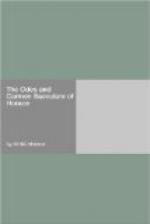A very few words will serve to conclude this somewhat protracted Preface. I have not sought to interpret Horace with the minute accuracy which I should think necessary in writing a commentary; and in general I have been satisfied to consult two of the latest editions, those by Orelli and Ritter. In a few instances I have preferred the views of the latter; but his edition will not supersede that of the former, whose commentary is one of the most judicious ever produced, within a moderate compass, upon a classical author. In the few notes which I have added at the end of this volume, I have noticed chiefly the instances in which I have differed from him, in favour either of Hitter’s interpretation, or of some view of my own. At the same time it must be said that my translation is not to be understood as always indicating the interpretation I prefer. Sometimes, where the general effect of two views of the construction of a passage has been the same, I have followed that which I believed to be less correct, for reasons of convenience. I have of course held myself free to deviate in a thousand instances from the exact form of the Latin sentence; and it did not seem reasonable to debar myself from a mode of expression which appeared generally consistent with the original, because it happened to be verbally consistent with a mistaken view of the Latin words. To take an example mentioned in my notes, it may be better in Book III. Ode 3, line 25, to make “adulterae” the genitive case after “hospes” than the dative after “splendet;” but for practical purposes the two come to the same thing, both being included in the full development of the thought; and a translation which represents either is substantially a true translation. I have omitted four Odes altogether, one in each Book, and some stanzas of a fifth; and in some other instances I have been studiously paraphrastic. Nor have I thought it worth while to extend my translation from the Odes to the Epodes. The Epodes were the production of Horace’s youth, and probably would not have been much cared for by posterity if they had constituted his only title to fame. A few of them are beautiful, but some are revolting, and the rest, as pictures of a roving and sensual passion,




